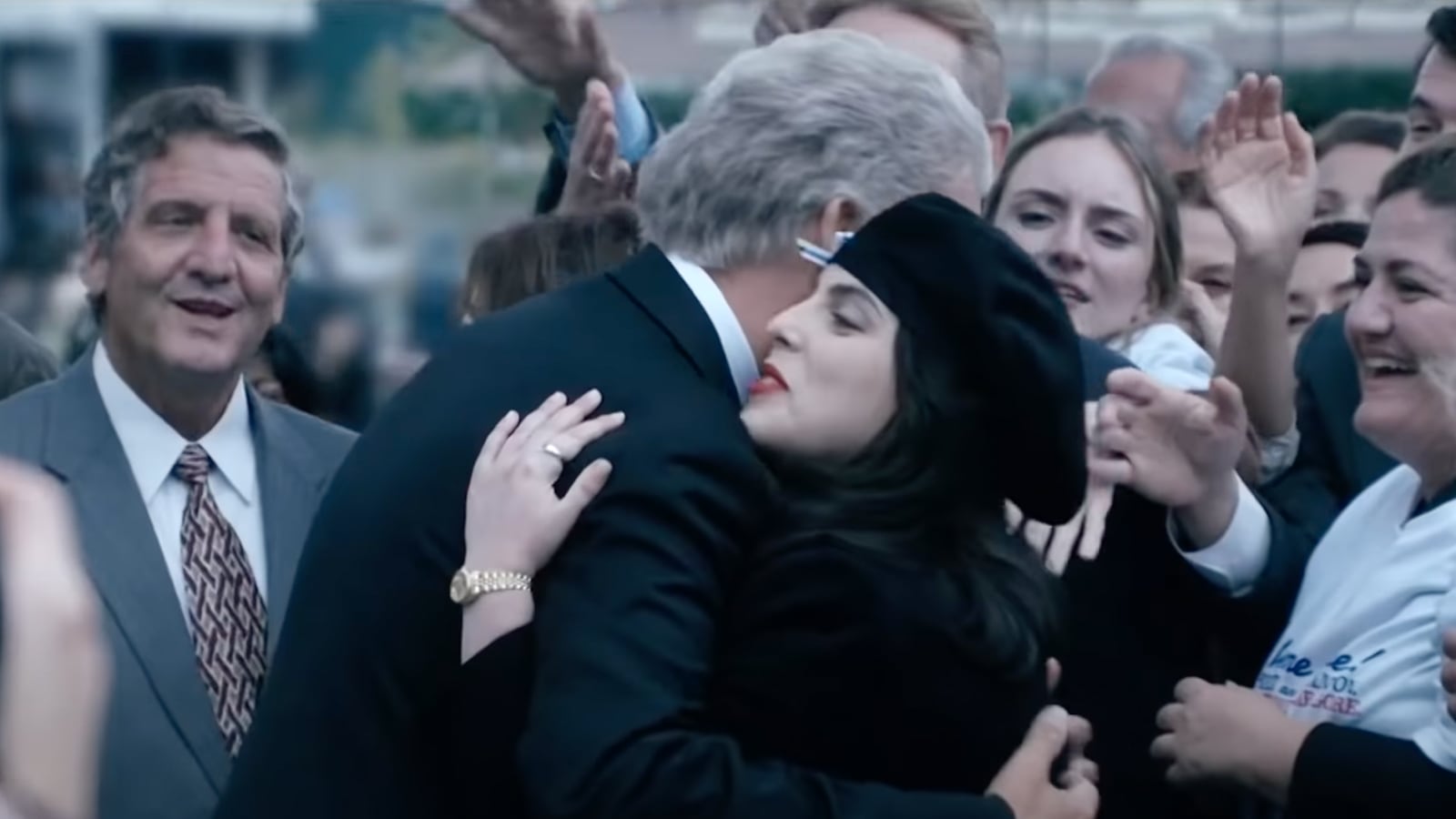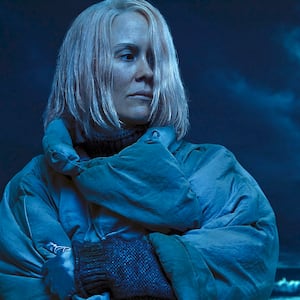It’s about seven minutes into the premiere of Impeachment: American Crime Story when Linda Tripp is called a “treacherous bitch.”
That Monica Lewinsky is the character who says this about the recently deceased civil servant shouldn’t necessarily be a surprise. As anyone who followed what may be the biggest political scandal of the last century remembers, Lewinsky ended her 1998 grand jury testimony by tearfully saying, “I hate Linda Tripp.”
But it is a notable start to the series. Ahead of the Sept. 7 premiere of FX’s Impeachment, the third installment of Ryan Murphy’s Emmy-winning American Crime Story anthology, producers revealed that not only is the goal of the series to give an overdue voice to Lewinsky, decades after she wasn’t afforded the opportunity to defend herself against a public shaming, but Lewinsky herself consulted on “every word” on “every script page.” There’s even an episode titled “The Assassination of Monica Lewinsky.”
Yes, Impeachment, which counts Sarah Burgess as executive producer and writer, was in the works at FX before Lewinsky and Murphy ever met and he made the decision that it could not move forward without her hands-on involvement as producer. And it was even scheduled to go into production before the 2016 election at a time when it appeared as if Hillary Clinton was going to be president.
But no matter how nuanced, balanced, or, to borrow a political term maybe not often applied to television production, “both sides” Impeachment seeks to be—and very often is—it’s hard to shake the fact of Lewinsky’s involvement. Producers assured that Lewinsky was “incredibly mindful of not wanting to speak to rooms she had not been in,” in reference to private conversations between Bill and Hillary Clinton, specifically. Still, the earlier iterations of American Crime Story centering the O.J. Simpson trial and the assassination of Gianni Versace had not involved the real-world counterparts in this direct of a manner.
The end result, at least in the episodes provided, is the captivating, if at times outrageous and baffling, product of a near-impossible task. A tornado of ambition leaves destruction in its wake. Depending on your temperament, it’s a creative force you stand in awe of and maybe even chase—or flee from at the first sound of the storm siren.
The series takes care to justify the motivations of Tripp (played by Sarah Paulson), who betrayed her friend’s trust, secretly taped phone calls with Lewinsky discussing her presidential affair, and provided them to the FBI. It details the ways in which Tripp was, at one point, a caring friend. Alternatively, it paints her as a delusional megalomaniac; a narcissist harboring a petty grudge after being exiled from her post in the West Wing.
Paula Jones (Annaleigh Ashford), whose sexual-harassment lawsuit against the president was the catalyst for Tripp and Lewinsky’s legal and public involvement in the efforts to impeach Clinton, is afforded the dignity and grace she wasn’t given when she first came forward and was belittled for her looks, presumed opportunism, and perceived lack of intelligence.

Sarah Paulson as Linda Tripp and Beanie Feldstein as Monica Lewinsky in Impeachment: American Crime Story
FXWe see the ways she was foisted onto a trapeze and flown into the circus of media scrutiny with no safety net below her—lost, scared, and confused. We see also how she was taken advantage of by political players with their own agendas that superseded her well-being. But for all its condemnation of the ways in which Jones was dismissed and ridiculed, the series also can’t resist mining her simpleness for its own beats of humor.
Bill Clinton (Clive Owen) lurks in the shadows like a horror film’s Big Bad—calculating and gaslighting, devoid entirely of his infamous Arkansas charm—while Hillary (Edie Falco), who barely appears in the first seven episodes, seems to be a Rubik’s cube of a character that the writers couldn’t figure out how to crack respectfully, opting to instead largely lay off.
Then there’s Monica herself, played by Beanie Feldstein, who, for the intimacy of Lewinsky’s involvement, remains the show’s most indiscernible figure, a cipher and a foil for whatever the show is attempting to say in any given episode about the other characters, themes, or us as a nation. There may, however, be another argument that looking at Lewinsky in her totality—a woman whose public persona had been so reductive and incorrect—is jarring to an audience who’s been groomed to think one way about her for so many years.
In the series, she’s the young girl suffering from a bad case of puppy love. The innocent target preyed upon. The intelligent rising star. The woman in control of her sexual desire. The tortured other woman. The collateral damage to a powerful man’s disregard. The desperate friend. The double-crossed confidante. The confused FBI hostage. The strong. The smart. The insecure. The heartbroken. The bullied. The vilified. The manipulated.
Of course, this is the entire point of the show, to reframe what we know about Lewinsky—as well as Jones and Tripp—by exploring the events leading up to Clinton’s impeachment trial through their experiences: the misogyny and sexism they experienced and how they navigated—and saw their reputations destroyed by—the country’s sexual politics, partisan conflict, and an increasingly invasive media landscape. It ultimately achieves that goal, though it might gain more attention for its trips and falls on the way to the finish line.
Gossip is a running theme in Impeachment, and it’s circulated around the series, too. Critics and journalists have been trading reactions ever since the episodes were made available. It seems as if every single person has a different, extreme response not just to the series as a whole, but also on an episode-by-episode, scene-by-scene, and performance-by-performance basis.
Linda Tripp has been cleverly humanized, or the series sets out to paint her as an irredeemable monster. Clive Owen is doing astounding work approximating the voice and vibe of Bill Clinton, or he is horribly miscast. The episode centered around Lewinsky’s 12-hour FBI interrogation is a tour de force, or it’s too sympathetic and overwrought.
Reaction to everything will be divided. It will be divided by generation—who was of voting age when this happened 25 years ago, who was old enough to at least remember it as a defining news story, and who learned about it through history books and pop culture like this. It will be divided by gender. Obviously, it will be divided by political leaning, and maybe even by a realm just as volatile: tolerance for the Ryan Murphyverse, star casting gimmicks, and the stylized dramatization of history.
At a time when polarized discourse can seem overly reactionary and in bad faith, it’s thrilling for a series to both live up to its pedigree and expectation as a bona fide television event and invite, not bait, intense reaction. That viewers might cycle between dismissal, intrigue, outrage, empathy, admiration, and annoyance was inevitable. This is Monica Lewinsky we’re talking about. This is the Clintons we’re talking about. The challenge is creating a product that stands up not just to the scrutiny, but to the decades of insanity that underlies it.
To that end, there are key creative choices that aid or detract from that mission, depending on your point of view.
The series premiere, for one, goes for a stretch of 40 minutes without showing Monica Lewinsky at all. It jumps back and forth through time over the course of five years, both creating narrative tension and confusing anyone who doesn’t have encyclopedic knowledge of the Clinton scandal’s timeline. It begins in January 1998, with Tripp tricking Lewinsky into meeting her for lunch so that she can turn her into the feds for questioning. Once she calls Tripp a treacherous bitch, Lewinsky disappears until the tail end of the episode.
That signals to viewers the series’ intent to cover a larger scope of the scandal; the episode also jumps back to 1993, when Vince Foster killed himself at the height of the Whitewater controversy, and to 1994, when the Paula Jones news first broke. It also hints that, for our preoccupation with Lewinsky, it may actually be more accurate to call this a series about Linda Tripp.
Yes, a bulk of it centers around their friendship—it’s certainly more about Lewinsky and Tripp than Lewinsky and Clinton. But Tripp is the driving agent for almost all that happens to Lewinsky in the series. Her presence looms over nearly everything; even an episode that centered around the media’s grotesque shaming of Lewinsky spends considerable time on how the same treatment of Tripp affected her and her family.
The tension that scratches at you—in the end, what are we supposed to feel about Tripp?—dominates, and is never, at least not in the first seven episodes, resolved.
Much has and will be made about the casting of Sarah Paulson as Tripp. The Emmy-winner spent three hours each day being fitted into prosthetics, gained 30 pounds, wore extra padding, and worked with a movement coach to transform into her.
It takes an episode to get used to the mannered physicality, and then you appreciate how sensational Paulson is in the role, delivering a finely- tuned calibration of resentment, hurt, viciousness, caustic vulnerability, and even warmth. Yet you have to question the rationale to cast an actress who requires what’s often referred to as a “fat suit” to play a woman in a series that explores the cruelty and shame she experienced because of her weight, from her own obsession with dieting and counting calories to John Goodman being cast to mock her size and looks on Saturday Night Live.
It’s but one volatile issue in what may be the year’s most volatile program. And, after near-universal acclaim for the previous iterations of American Crime Story and the ways in which they recast our understanding of a major cultural event through a modern perspective, it’s one reason Impeachment might piss people off. A lot of people will be pissed off, for different reasons. That doesn’t mean that the series is good or bad—there are times when it is an extreme example of both—but it means that it’s touching nerves either way.
Was Linda Tripp a patriot and a feminist? Someone who saw a woman being taken advantage of by a man in power and wanted justice? A person who rebelled against the idea that she was insignificant, who dared to be in control of her own career and story? Or was she an irredeemable “treacherous bitch?”
Is Monica Lewinsky vindicated? Are we evolved enough now to see how we were complicit in the demonizing, mistreatment, and manipulation of a young girl who made a mistake that derailed a promising career and ruined her life? Or are we simply learning more about the life of the most famous example of a kind of woman who continues to be victimized in the same way 25 years later?
And what about the Clintons? Was it smart not to show the sex scenes? Was it smart to talk so often about what Bill’s penis looked like? Is this kind of soap opera treatment of the scandal responsible? Enlightening? Gratuitous trash? Prestige reconsideration?
Impeachment is more uneven than any of the other American Crime Story installments, from the performances to its politics. Maybe that will get it pilloried, but perhaps it should get it appreciated. Fittingly enough given the subject matter, it has the courage to put its own ambitions on trial.



